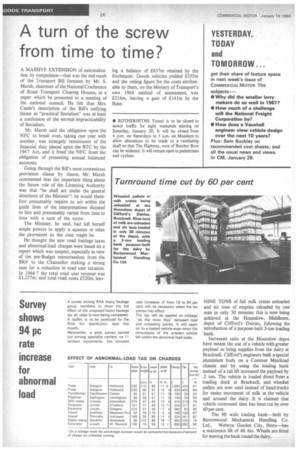A turn of the screw from time to time?
Page 28

If you've noticed an error in this article please click here to report it so we can fix it.
A MASSIVE EXTENSION of nationalization by compulsion—that was the end result of the Transport Bill foreseen by Mr. S. Marsh, chairman of the National Conference of Road Transport Clearing Houses, in a paper which he presented to a meeting of the national council. He felt that Mrs. Castle's description of the Bill's unifying theme as "practical Socialism" was at least a confession of the normal impracticability of Socialism.
Mr. Marsh said the obligation upon the NFC to break even, taking one year with another, was strangely reminiscent of the financial duty placed upon the BTC by the 1947 Act, and it freed the NFC from the obligation of presenting annual balanced accounts.
Going through the Bill's most contentious provisions clause by clause, Mr. Marsh commented that the important thing about the future role of the Licensing Authority was that "he shall act under the general directions of the Minister"; he would therefore presumably require to act within the guide lines of the interpretations dictated to him and presumably varied from time to time with a turn of the screw.
The Minister, he said, had left herself ample powers to apply a squeeze or relax the provisions as the case might be.
He thought the new road haulage taxes and abnormal-load charges were based on a report which was suspect, especially in view of the pre-Budget memorandum from the BRF to the Chancellor making a strong case for a reduction in road user taxation. In 1966-7 the total road user revenue was £1,157m, and total road costs £520m, leav
ing a balance of £637m retained by the Exchequer. Goods vehicles yielded £355m and the ceiling figure for the costs attributable to them, on the Ministry of Transport's own 1964 method of assessment, was £214m, leaving a gain of £141m by the State.




















































































































